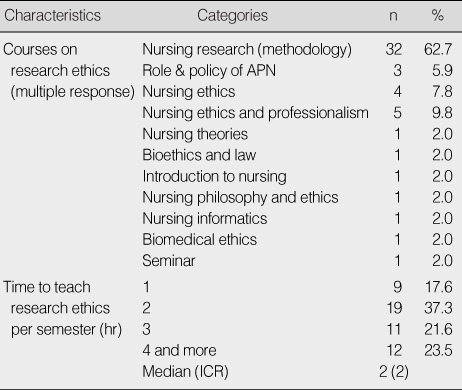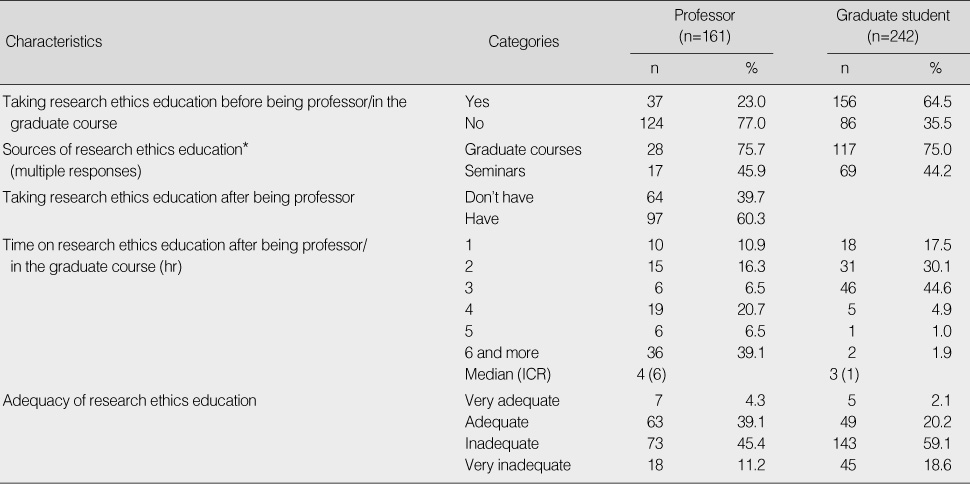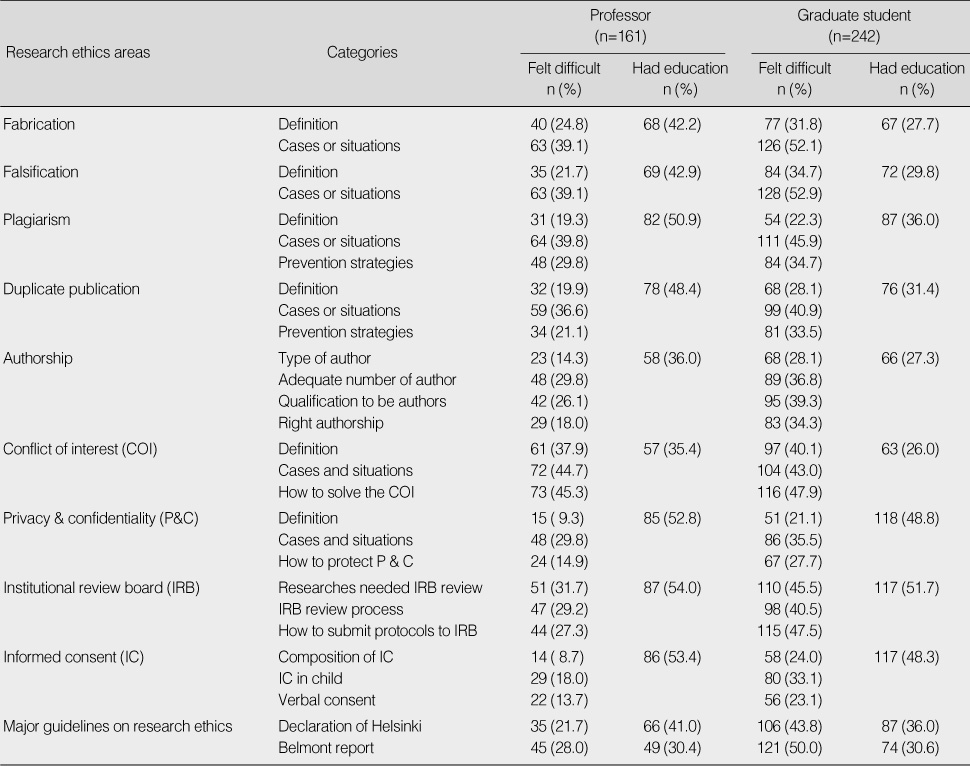Articles
- Page Path
- HOME > J Korean Acad Nurs > Volume 40(4); 2010 > Article
-
Original Article
- Educational Needs Assessment on Research Ethics among Nursing Researchers
- Ihn Sook Jeong, Mee Ock Gu, Keum Soon Kim, Kwang Ja Lee, Soo Yang
-
Journal of Korean Academy of Nursing 2010;40(4):515-523.
DOI: https://doi.org/10.4040/jkan.2010.40.4.515
Published online: August 31, 2010
1Associate Professor, College of Nursing, Pusan National University, Busan, Korea.
2Professor, College of Nursing, Gerontological Health Research Center, Gyeongsang National University, Jinju, Korea.
3Professor, College of Nursing, Seoul National University, Seoul, Korea.
4Professor, College of Nursing, Ewha Womans University, Seoul, Korea.
5Professor, College of Nursing, The Catholic University of Korea, Seoul, Korea.
- Address reprint requests to: Jeong, Ihn Sook. College of Nursing, Pusan National University, Beomeo-ri, Mulgeum-eup, Yangsan 626-870, Korea. Tel: 82-51-510-8342, Fax: 82-51-510-8308, jeongis@pusan.ac.kr
Copyright © 2010 Korean Society of Nursing Science
Abstract
-
Purpose
- This study aimed to investigate the educational needs of research ethics among nursing researchers.
-
Methods
- Convenience sample of 161 nursing professors and 262 master or doctoral nursing students participated in the study. Data was collected with self-reported questionnaire from June to August 2009, and analyzed with descriptive statistics using SPSS WIN (version 14.0).
-
Results
- Among 161 nursing professors, about 31.7% has educated nursing ethics in the postgraduate course. The most common course was nursing research or methodology (62.7%), and median education time was 2 hr. Areas that showed difficulty in understanding was the conflict of interest and plagiarism for professors and falsification and fabrication for graduate students. Average knowledge on the research ethics was 75.4 points for professors and 61.6 points for students based on the 100 points.
-
Conclusion
- Educational needs of research ethics among nursing professors and students in the postgraduate course was high. We recommend both basic and advanced research ethics educational programs for the nursing researchers. The basic course should be at least 6 hr and include various cases and something to discuss.
- 1. Abbott A. Science comes to terms with the lessons of fraud. Nature. 1999;398:13–17.ArticlePubMedPDF
- 2. Burkemper JE, DuBois JM, Lavin MA, Meyer GA, McSweeney M. Ethics education in MSN programs: A study a national trends. Nursing Education Perspectives. 2007;28:10–17.PubMed
- 3. Burns N, Grove SK. Understanding nursing research: Building an evidence-based practice. 2007;4th ed. St Louis, MO, Saunders.
- 4. Code of Federal Regulation. Department of Health and Human Services (DHHS). 2009;07 14 Retrieved April 12, 2010. from http://www.hhs.gov/ohrp/humansubjects/guidance/45cfr46.htm.
- 5. Dunn CM, Chadwick GL. Protecting study volunteers in research: A manual for investigative sites. 2004;3rd ed. Boston, MA, CenterWatch.
- 6. Friedman PJ. An introduction to research ethics. Science and Engineering Ethics. 1996;2:443–456.ArticlePubMedPDF
- 7. Good Publication Practice Guidelines for Medical Journals. Korean Association of Medical Journal Editors (KAMJE). 2008;01 31 Retrieved April 12, 2010. from http://www.kamje.or.kr/intro.php?body=publishing_ethics.
- 8. Guidelines on Good Publication Practice. Committee on Publication Ethics (COPE). 1999;04 27 Retrieved April 12, 2010. from http://publicationethics.org/static/1999/1999pdf13.pdf.
- 9. Jeong IS. Developing the educational program on research ethics for nursing researcher. 2008;Seoul, Korea Research Foundation.
- 10. Kempers RD. Ethical issues in biomedical publications. Human Fertility. 2001;4:261–266.ArticlePubMed
- 11. Kim OJ. The Nuremberg Code and ethics of human subject research. Korean Journal of Medical Ethics Education. 2002;5:1–20.
- 12. Korea Food and Drug Administration. Korea good clinical practice (Document No 2007-34). 2007;05;Seoul, Author.
- 13. Macnee C, McCabe S. Understanding nursing research. 2007;New York, NY, Lippincott Williams & Wilkins.
- 14. Polit DF, Hungler BP. Nursing research: principles and methods. 2004;7th ed. Philadelphia, PA, Lippincott Williams & Wilkins.
- 15. Shamoo AE, Resnik DB. Responsible conduct of research. 2003;Oxford, Oxford University Press.
- 16. Song SS, Kim SK. Research ethics issues and problems. Innovative Polices Brief. 2006;9:3–20.
- 17. Steneck N. Confronting misconduct in science in the 1980s and 1990s: What has and has not been accomplished? Science and Engineering Ethics. 1999;5:161–176.ArticlePubMedPDF
- 18. Uniform requirements for manuscripts submitted to biomedical journals: Writing and editing for biomedical publication. International Committee of Medical Journal Editors (ICMJE). 2008;10;Retrieved April 12, 2010. from http://www.icmje.org/urm_full.pdf.
REFERENCES
Figure & Data
REFERENCES
Citations

- Nurses’ Experience and Satisfaction as Research Participants in Nursing Research - A View of Protecting Vulnerable Populations: A Cross-sectional Descriptive Study
Go-Eun Lee, Sanghee Kim
Korean Journal of Adult Nursing.2022; 34(6): 565. CrossRef - Nursing Faculties’ Knowledge of and Attitudes Toward Research Ethics According to Demographic Characteristics and Institutional Environment in Korea
Sukhee Ahn, Geum Hee Jeong, Hye Sook Shin, Jeung-Im Kim, Yunmi Kim, Ju-Eun Song, Sun-Hee Kim, Ju Hee Kim, Yun Jung Lee, Young A. Song, Eun Hee Lee, Myoung-Hee Kim
Sage Open.2020;[Epub] CrossRef - Knowledge and Attitudes of Social Behavioral Researchers on Institutional Review Board (IRB) Reviews*
Go-Eun LEE, Sanghee KIM, Min-Shik KIM, Eui Geum OH
Korean Journal of Medical Ethics.2017; 20(3): 287. CrossRef - Effects of Nursing Research Support Program on the Attitudes and the Barriers of the Nurse
Young-Ok Yang
Journal of the Korea Academia-Industrial cooperation Society.2015; 16(12): 8556. CrossRef - Operational effectiveness of blended e-learning program for nursing research ethics
Kap-Chul Cho, Gisoo Shin
Nursing Ethics.2014; 21(4): 484. CrossRef - A Study on the Research Ethics of Occupational Therapy Researchers
So-Yeon Park, Jin-Kyung Kim
Journal of Korean Society of Occupational Therapy.2014; 22(1): 97. CrossRef - Level of Awareness, Self-efficacy and Knowledge of Research Ethics among Nursing Graduate Students*
Eui Geum OH, Sang Hee KIM, Jae Yong YOO
Korean Journal of Medical Ethics.2012; 15(2): 244. CrossRef - The Development and Evaluation of a Research Ethics Course for a Graduate-level Educational Program in Nursing
Euigeum OH, Sanghee KIM, Jae Yong YOO, Sosun KIM, Sunah KIM, Eunhee CHO
Korean Journal of Medical Ethics.2011; 14(4): 482. CrossRef
Characteristics of Research Ethics Courses Provided by Nursing Professors (N=51)
APN=advanced practice nurse; ICR=Interquartile range.
Characteristics of Taking Educational Programs on Research Ethics
*Only the persons who said 'Yes' in the item of "Taking research ethics education before being professor/in the graduate course" can respond to this item (N=37 for professor, N=156 for graduate student). ICR=Interquartile range.
Research Ethics Areas Where The Participants Felt Difficult or Had Educational Experience*
*Multiple responses.
Awareness of Necessity on Research Ethics Education*
*Frequency and percent of 'agree' or 'strongly agree' answers.
Knowledge on the Research Ethics
APN=advanced practice nurse; ICR=Interquartile range.
*Only the persons who said 'Yes' in the item of "Taking research ethics education before being professor/in the graduate course" can respond to this item (N=37 for professor, N=156 for graduate student). ICR=Interquartile range.
*Multiple responses.
*Frequency and percent of 'agree' or 'strongly agree' answers.
 KSNS
KSNS
 E-SUBMISSION
E-SUBMISSION





 Cite
Cite

